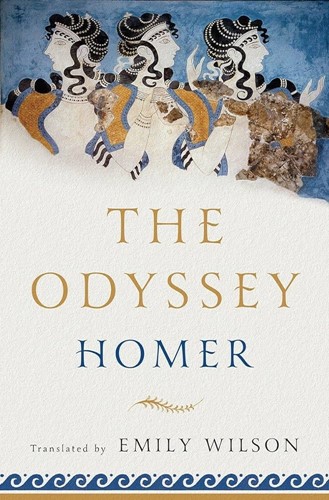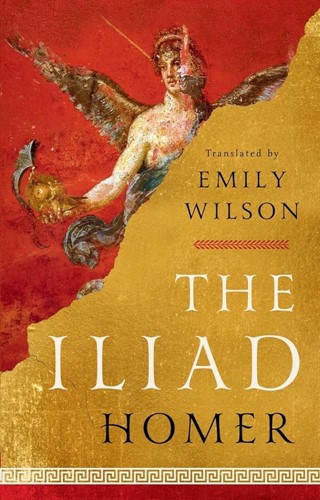Emily Wilson’s recent translation of Homer’s The Odyssey signals a new stage in the journey of Ancient Greece’s most important hero. This new edition, available at YPRL, invites readers to experience The Odyssey from a fresh perspective.
journey of Ancient Greece’s most important hero. This new edition, available at YPRL, invites readers to experience The Odyssey from a fresh perspective.
In 2018, Emily Wilson became the first woman to translate the epic poem into English. Her translation departs from previous versions through her use of crisp and rhythmic language, whereas previous versions are seen as verbose to many readers.
This represents a huge problem for modern readers. As Wilson writes in her extensive introduction, "children throughout history first learn about Ancient Greece through some of the stories in The Odyssey, and that this education continues through adolescence into college." The point being that Homer’s poetry was intended to be read and understood by people of all ages and backgrounds.
This is why this newest translation is so important. The clarity of the language gives new life to Odysseus’ legendary journey. We feel as though we are reading the story for the first time, and this is not a coincidence.
Wilson makes an interesting point about the history of the poem. As is commonly said of Homer, the poet was blind and illiterate, so he could not have written the poem down. However, In Ancient Greece, there were many poets who spoke and performed great stories in public from memory. Given the Odyssey has over 12,000 lines, this feat of memory seems almost impossible today. It may be, however, that despite blindness and illiteracy, Homer had a remarkable memory for stories told before his lifetime. His job was to keep on telling them.

People relied on the gifted memory and performance of the poets, until eventually, Greek scribes wrote down poems. Maybe this was done under the supervision of Homer, allowing the stories of The Odyssey to survive for the Greeks.

Today, the poem traverses’ languages, borders, and time. As Wilson says in her introduction to her new translation, "Poetry is the art of memory, the mother of the muses." By writing down the poem, the act of remembering is repeated throughout history, up until today and beyond. Thanks to this excellent new translation from Wilson, along with an enlightening introduction, we can once again journey into one of the greatest stories ever told.
Engaging with poetry strengthens our memory and enhances our experience of the present moment. It allows us to have a personal, private experience with the poem and our memories, and find harmony in them through our reading. Reading the great poems, for us and the Ancient Greeks, grants the remembrance of a time before we were born. And with this newest translation from Emily Wilson, this epic poem also has been reborn.
Emily Wilson’s translation of The Iliad is also available from YPRL, along with a wide range of Ancient History books. A hardback edition of The Odyssey is also available, along with an e-book edition (translation by Alexander Pope).
Some similar popular related titles include:
The Song of Achilles by Madeline Miller
Also available as eBook (Libby), eBook (Borrow Box), eAudio (Libby).
Patroclus, an awkward young prince, has been exiled to the court of King Peleus and his perfect son Achilles. Despite their differences, Achilles befriends the shamed prince, and as they grow into young men skilled in the arts of war and medicine, their bond blossoms into something deeper - despite the displeasure of Achilles's mother Thetis, a cruel sea goddess. But when word comes that Helen of Sparta has been kidnapped, Achilles must go to war in distant Troy and fulfill his destiny. Torn between love and fear for his friend, Patroclus goes with him, little knowing that the years that follow will test everything they hold dear.
Clytemnestra by Costanza Casati
Also available as eBook (Borrow Box), and Audiobook (MP3).
As for queens, they are either hated or forgotten. She already knows which option suits her best... Mother. Monarch. Murderer. Magnificent. You are born to a king, but marry a tyrant. You stand helplessly as he sacrifices your child to placate the gods. You watch him wage war on a foreign shore and comfort yourself with violent thoughts of your own. You play the part, fooling enemies who deny you justice. Slowly, you plot. You are Clytemnestra.
The Greek Myths that Shape the way we Think by Richard Buxton
The Greek myths have been retold countless times, first by the conquering Romans, then through the medieval and Renaissance eras of Europe, and finally finding new expression in masterworks of art, literature and cinema on the global stage. Classical scholar Richard Buxton explores the stories at the heart of this ancient mythology and how they have come to influence our society today. The Greek legends seem to speak to us universally, their deities tantalizingly human, often indulging in behaviours morally ambiguous at best and obscene at worst, and their heroes dealing with dilemmas and destinies that echo, if exaggeratedly, conflicts in our own lives.
Mythos by Stephen Fry
In Stephen Fry's vivid retelling, we gaze in wonder as wise Athena is born from the cracking open of the great head of Zeus and follow doomed Persephone into the dark and lonely realm of the Underworld. We shiver in fear when Pandora opens her jar of evil torments and watch with joy as the legendary love affair between Eros and Psyche unfolds. Mythos Illustrated captures these extraordinary myths for our modern age in stunning colour - in all their dazzling and deeply human relevance.



![Clytemnestra [electronic resource]](/media/30knr1hp/clytemnestra.jpg)

